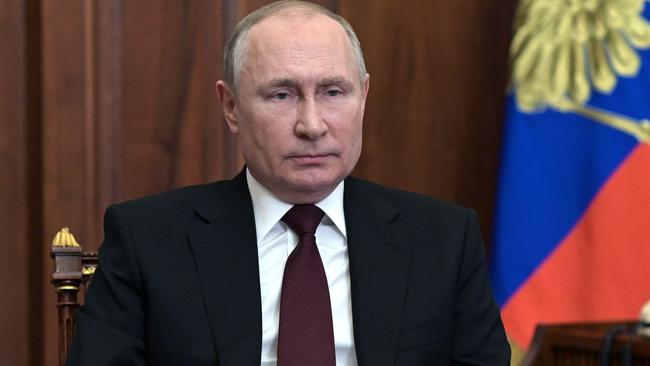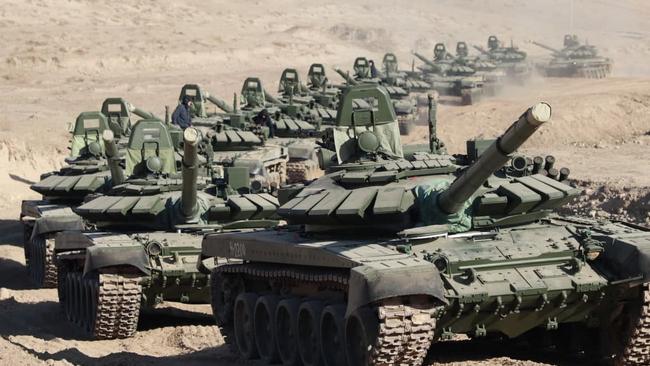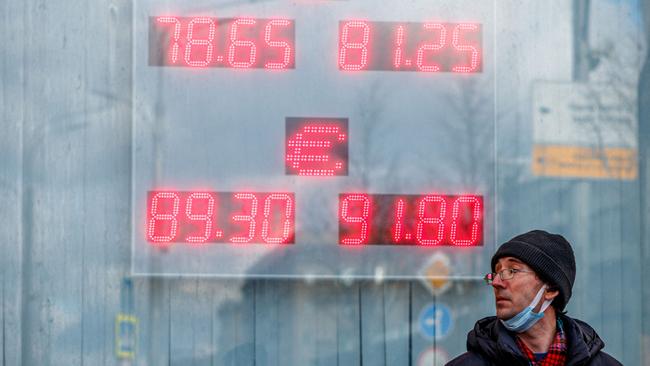Russia’s control over oil, gas and coal leaves Australia vulnerable
The economic impact of Russia’s invasion on Ukraine could go one of three ways for Australia – and it shows how much power Vladimir Putin has.
Economy
Don't miss out on the headlines from Economy. Followed categories will be added to My News.
ANALYSIS
Now that Russia has invaded Ukraine, how will this affect the Australian economy?
We must first note that right now it is difficult to tell. We don’t know if Russian President Vladimir Putin has in mind recapturing Russian borderlands to build a buffer against a NATO that has expanded right to his borders. Or, if he has in mind the restoration of Russian imperial glory. Or some mix of the two.

What we can say is that there are a few points of economic connectivity between Russia and the world that are being stressed and that stress will climb in direct correlation with the intensity of the conflict.
We can go further and observe that these points of connection just happen to be areas that are already causing central banks to freak out about inflation so the Russia adventure is likely to make things worse for markets in that sense.
What I am talking about? In one word: energy.
Russia is a very large energy supplier to the world and especially Europe. It exports roughly 10 per cent of global oil, 20 per cent of global gas and 20 per cent thermal coal.
To describe this as material doesn’t quite say it. That is why no other country, not even the US nor Europe, has applied energy sanctions upon Russia in response to the crisis. They can’t. It’s simply too important a supplier.
So, what happens if the Ukraine situation deteriorates even further. Let’s use some scenarios to figure the impact on Australia.
Likely outcome if Russia invades slowly
If Russia’s invasion of Ukraine settles down and turns into a steady occupation of areas favourable to Russian rule, then the crisis will pass quickly.
This is possible if Mr Putin decides to occupy Ukraine slowly, piece-by-piece. Taking territory, stabilising it, then destabilising more neighbourly areas and moving in there as well in a few more years.

This scenario will build in small geopolitical risk price premiums to all of the above energies.
However, all three commodity prices are already very elevated on Covid disruptions. So, such price premia will likely disappear amid price falls as Covid supply-side blockages clear and when Western central banks, especially in the US, lift interest rates.
This scenario presents the possibility of easing inflation and a soft-landing for developed economies. In Australia’s case, the effect of higher energy prices on activity is roughly neutral. Our LNG export earnings rise as our oil import bills rise too. Most salient is that this represents a transfer of wealth from households to energy producers so most of us will probably feel worse off as the petrol pump sucks away income, with not much overall impact on interest rates nor the currency.

What if Russia gets even more aggressive?
A more aggressive Russian push into eastern Ukraine will lift these price premiums and the more bloody it gets the worse it will be.
In this scenario, overseas central banks would be forced to lift interest rates even faster. Australia still does not have the same inflation problem as other developed economies so it will only pressure the RBA to lift at the margin. And it may just “look through it”.
However, global rate hikes would pressure bank margins and they may well raise mortgage rates “out of cycle”. It may not be much comfort to know that this will make the RBA even more patient.
Especially since, faster and steeper US rate hikes could accelerate stock market volatility and quite possibly crash prices. In turn, that would be very disruptive to consumption and send a trade shock into China and around the world.
This is the boom and bust scenario.
What if it starts a larger conflict?
The third case is one in which Russia loses control of its Ukrainian push and the conflict threatens to spill over into all of Ukraine and even neighbouring countries. War is inherently unpredictable and when the blood is up in occupied populations, very unfortunate outcomes become possible.
Oddly, this scenario might offer less economic harm than the second because central banks may pause their tightening regimes. If oil were to rocket to $150 or above then the economic shock alone could be enough to give authorities pause.
That said, it would also be enough to do significant harm to global growth by itself, including to Australia, as consumers buckle under the pressure of the price at the pump, other transport and utility bill shock.
It’s not the 1970s and we have time and options to mitigate the Ukrainian economic fallout. The most important outcome is that the worse Ukraine gets, the more global energy prices will probably rise, with each intensification deepening the damage to households.
David Llewellyn-Smith is Chief Strategist at the MB Fund and MB Super. David is the founding publisher and editor of MacroBusiness and was the founding publisher and global economy editor of The Diplomat, the Asia Pacific’s leading geopolitics and economics portal. He is the co-author of The Great Crash of 2008 with Ross Garnaut and was the editor of the second Garnaut Climate Change Review. MB Fund is underweight Australian iron ore miners.
Originally published as Russia’s control over oil, gas and coal leaves Australia vulnerable


